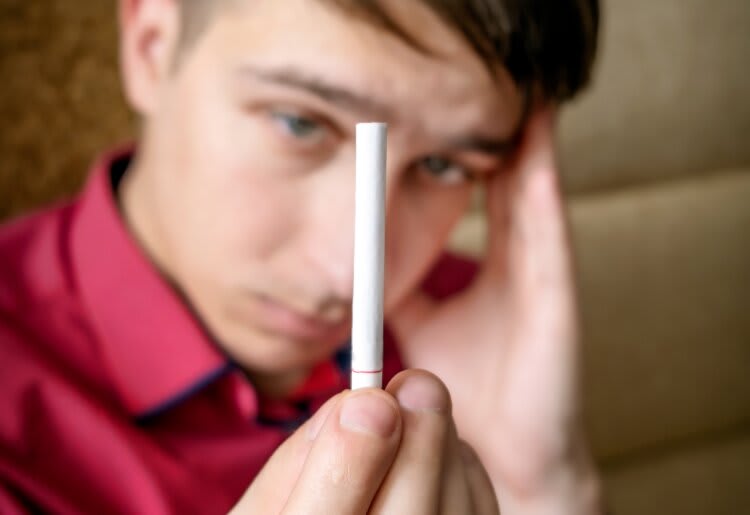Recovery from even the most common types of addiction isn't easy.
Annually, addiction affects tens of millions of Americans and takes tens of thousands of lives. Addiction is typically characterized by multiple failed attempts to moderate or eliminate it, indicating a loss of control over your behavior, as well as the need for more and more of a substance or behavior to achieve its initial effects.
But that doesn't mean it's impossible to recover.
» Need professional help? Check out our top 10 picks for the best online therapy sites and services.
Recovery From Addiction: The Facts
Though addiction can be hard to beat on your own, research shows that effective treatment like online therapy can lower your risk of relapse and reduce the severity of symptoms. In fact, the vast majority of those who receive professional treatment for addiction—and want to—successfully recover.
But what does recovery actually look like? And how do you or your partner even begin this process? Here are 10 steps you can take toward recovery.
10 Steps to Help You Recover From Addiction
1. Acknowledge the Problem
As I remind clients struggling with addiction, you can't change a behavior unless you recognize its consequences.
Your recovery begins with examining how your addictive behavior has negatively impacted your physical or emotional health, important relationships, or school or work endeavors.
2. Clarify Your Readiness to Change
A primary task of addiction recovery that I tackle with clients is helping them clarify where they are in the change process and what their own motivations to change might be.
Ask yourself these questions to help you discern where to begin and where you need support most:
- Do you disagree or agree that change is necessary?
- Do you want to begin treatment?
- How ready are you to change?
- What might you need to feel more ready?

3. Get Medically Evaluated
If you’re considering reducing or quitting a substance you’ve heavily used for weeks, months, or years, be sure to get medically evaluated first. You may need to enter a detox facility for close medical monitoring.
A regular checkup also won’t hurt to assess the damage your addiction has wrought on your health.
4. Identify Supports
I always encourage clients to arm themselves with ample support as they prepare for recovery from addiction.
So long as it encourages your recovery, support can be in the form of:
- A 12-Step program
- A therapist
- Family members
- Friends
- Colleagues
- A religious community
5. Examine Your Relationships
When I work with clients struggling with addiction, I encourage them to examine their relationships and identify those that fuel their addiction.
A large part of why people use or engage in problematic behavior is the company they keep. Friends, family, and colleagues may encourage self-destructive behavior. So too can certain work and geographical contexts.
6. Seek Healthier Connections
It’s crucial to foster relationships that help you maintain healthier habits. This helps distract recovering addicts from urges and increases rewarding feelings derived from sources other than substances or problematic behaviors.
I always ask clients struggling with addiction this: Identify at least one new activity you can do or one person you can spend time with each week that increases your sense of meaning and belonging.

7. Stop Shaming Yourself
Rarely have I seen a client admit they have a problem with a substance or behavior without feeling some degree of shame. But until you let go of beliefs that you're too broken, bad, or wrong to get better, you can't begin healing.
Shame also drives addiction, since people drink, drug, or engage in addictive behavior to escape this awful feeling. So I encourage clients to recognize their inherent worth, value, and potential—and immerse themselves in activities and relationships that increase positive self-views.
8. Make Amends With Feelings of Guilt
Shame (“I am bad”) isn’t the same as guilt (“I did something bad”). I hear so much regret and sadness from clients over things they’ve done due to their substance use or problematic behavior—things that have hurt others, especially those they love the most.
Often, I ask them how they can allow that guilt—a pro-social emotion—to guide them to address past wrongs, own what they've done, and apologize to those they've hurt unless doing so risks anyone's safety. This helps empower people in recovery by increasing a healthy sense of responsibility and repairing ruptured relationships.
9. Be Patient With Yourself
Behavioral change takes sustained effort in the face of setbacks or perceived “failures.”
I always remind my clients that they’re forging new neural pathways as they unhook themselves from drugs or problematic behaviors, and this won’t happen overnight!
10. Don’t Give up Hope
Most clients in recovery that I’ve worked with agree: Recovery from addiction can often feel like an uphill battle, especially in its earliest stages. But I remind them that “success” doesn’t equate to always feeling great or never making mistakes.
Rather, recovery means remaining committed to a meaningful life where your judgment is not clouded by excessive substance use or problematic behaviors.

Make Your Recovery Last
The therapy part of recovery is critical because it can address underlying conditions that may be fueling an addiction.
For example, online therapy for anxiety can be particularly helpful if you struggle to cope with all the feelings that tend to resurge once you give up a drug or behavior. Practicing ways to handle stress with a therapist can also be incredibly helpful in lowering your urge to use and reactivity to triggers.
Headlines of deaths and accidents from addiction can obscure how many recover from addiction each year. These simple steps can help you start to follow to their path.
» Struggling to find affordable help? Try online therapy that takes insurance.
